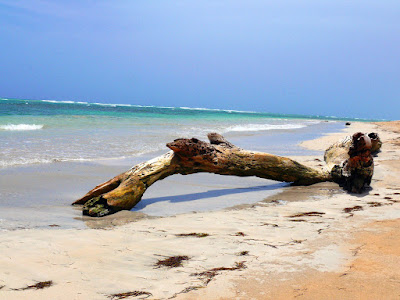"Setting" Stories Up For Success
Setting is super important to me. After finishing a book, my strongest take-away is usually the flavor and atmosphere that came from the setting. This is probably evident in the fact that I have a blog post series based around places and photos that I think would make awesome settings.
Visual media has an advantage in that it can throw way more detail at you far more efficiently than we can in writing. I could never hope to compete with the nuance you can get out of a single photo. Take any example...
Imagine how much it would take to get the same amount of visual information in a book. No descriptive paragraph would mention the poles and wires on the right wall, or exactly what the bench looks like, or the fine details of the vents and windows on the train. I wouldn't sit and talk about the transition of the tile on the floor, or how the light reflects differently here and there, or how the cables at the top cross the tracks.
It's hopeless to even try to match a picture or video pound for pound when it comes to visual detail. But writing has its own advantages!
No picture can give you the taste of the salt air. The sound of distant seagulls over the rolling crash of waves. The warm sand shifting between your toes. Writing can immerse. Transport.
The other thing writing can do is imagine the fantastic. No one's ever stood in a research facility on the surface of a sun, or used magic to bend fire and water. Sci-fi and fantasy have a huge opportunity with setting that other genres don't. This is why it's so, so important for me that the SFF I read has immersive, creative, memorable settings. European forests and mountains were fresh when Tolkein set the precedent for the genre, but nowadays, I'm more inclined to remember something new and unique, like the ash and mists of Mistborn.
In my opinion, other genres can benefit from remembering setting as well. Any good author incorporates a strong feel of setting in a given scene, no matter how mundane, and that's what makes the story feel alive. Spicing things up helps too--consider, how interesting is a living room, an office, or an alleyway, compared to a machine shop, a steam room, or an opera house? I'm 100x more likely to remember the latter examples!
I didn't really appreciate setting at first. I found it easy to blame my boredom on plot or characters. Sometimes I'd think, "This 'situation' feels cliché," without being able to put my finger on it. I found I loved something about certain chapters--found them more exciting somehow--in ways that didn't have to do strictly with plot and character. Brandon Sanderson talks a lot about setting in his lectures, but it didn’t sink in. He said things like how changing the setting was sometimes the missing ingredient in a scene that wasn’t working for him. I was all “that’s interesting,” and went on my merry way. It finally hit home when I started critiquing a lot, and I realized how many settings are recycled and ignored. Character and plot gets all the spotlight, and setting winds up as this poor forgotten child in the corner.
I discovered I had a bit of a problem with my last WIP due to the fact that half of it takes place in space, on spaceships. I realized how boring it felt to have scene after scene in the same canned stock of bridge, hallways, brig, and mess hall. Even with betrayal, politics, adventure, and space battles, the story felt flat. So I started playing with backdrops. What other rooms could I reasonably put on a spaceship? Instead of having a private conversation take place in a meeting room... how about talking as they walk through a hydroponics bay, on either side of long shelves of plants, only catching glimpses of each other through the black-leaved vines? If we have to be on a bridge, how about making the different ships have very visually different bridges? The water-worshipping religion could have temples with waterfalls on board. And how much could I incorporate windows with views of the warp space outside, or the cylindrical structure for the artificial gravity? Every time I noticed I was picturing a Star Trek set, I tried to take the important familiar components, and then add distinctive touches from my own worldbuilding.
Another example is a fantasy story that I thought had a really fun premise, yet kept feeling bored about. Finally, I figured out it's because I was picturing a really cliche "town and forest" setting. When I changed it to hot jungle with a bad guy owning a coffee plantation rather than a European estate, suddenly I liked it a hundred times better. It has a lot more flavor now.
In my opinion, setting is so powerful, and on an almost subconscious level. It so often slips under the radar--whether it's plain and makes the story feel plain, or it's awesome and makes the story stand out to me. But when I think back, it's always what I remember: the sandworms speeding through the vast desert in Dune, the writhing humanity of Trantor from Foundation (or empty desolation of fallen splendor, depending on which book you read), the gravity changes in and around Freeside in Neuromancer. I may forget all the details of the story and what on earth the characters were doing there, but the feel sticks with me for long, long after I've finished.


Comments
Post a Comment